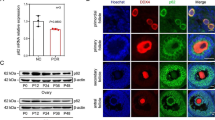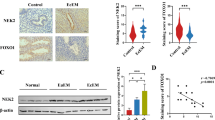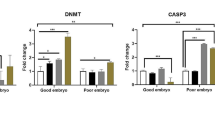Abstract
Embryo implantation is an essential and complex process in mammalian reproduction. However, little evidence has indicated the involvement of autophagy during embryo implantation. To determine the possible role of autophagy in uterine of pregnant mice during the peri-implantation stage, we first examined the expression of autophagy-related markers ATG5 and LC3 on day 4, 5, and 6 of pregnancy (D4, D5, and D6, respectively). Compared with expression on D4, downregulation of the autophagy-related markers was observed on D5 and D6, the days after the embryo attached to the receptivity endometrium. Further examination showed that autophagy-related markers ATG5, ATG12, LC3, cathepsin B, and P62 at the implantation site were significantly decreased when comparing with the inter-implantation site. Fewer number of autophagosomes at the implantation site were also observed by transmission electron microscopy. To confirm the functional role of autophagy during embryo implantation in mice, we administered the autophagy inhibitor 3-methyladenine and chloroquine to mice. After treated with 3-methyladenine, the expression of decidual markers HOXA10 and progesterone receptor were significantly reduced. Furthermore, a reduction in implantation sites and increase in the HOXA10 and PR protein levels were observed in response to chloroquine treatment. In addition, impaired uterine decidualization and dysregulation of the PR and HOXA10 protein levels was observed after autophagy inhibited by 3-methyladenine and chloroquine in in vivo artificial decidualization mouse model. In the last, LC3 and P62 were also observed in normal human proliferative, secretory, and decidua tissues. In conclusion, endometrial autophagy may be essential for embryo implantation, and it may be associated with endometrial decidualization during early pregnancy.
Key message
• Autophagy-related markers were significantly decreased at implantation site.
• Autophagy inhibition results in abnormal decidualization.
• Autophagy is essential for embryo implantation.







Similar content being viewed by others
References
Liu S, He J, Chen X, Ding Y, Geng Y, Wu M, Liu X, Wang Y (2014) Costimulatory molecule CD28 participates in the process of embryo implantation in mice. Reprod Sci 21:686–695
Liao XG, Li YL, Gao RF, Geng YQ, Chen XM, Liu XQ, Ding YB, Mu XY, Wang YX, He JL (2015) Folate deficiency decreases apoptosis of endometrium decidual cells in pregnant mice via the mitochondrial pathway. Nutrients 7:1916–1932
Zhang S, Lin H, Kong S, Wang S, Wang H, Wang H, Armant DR (2013) Physiological and molecular determinants of embryo implantation. Mol Asp Med 34:939–980
Ruan YC, Chen H, Chan HC (2014) Ion channels in the endometrium: regulation of endometrial receptivity and embryo implantation. Hum Reprod Update 20:517–529
Lamb CA, Yoshimori T, Tooze SA (2013) The autophagosome: origins unknown, biogenesis complex. Nat Rev Mol Cell Biol 14:759–774
Glick D, Barth S, Macleod KF (2010) Autophagy: cellular and molecular mechanisms. J Pathol 221:3–12
Song ZH, Yu HY, Wang P, Mao GK, Liu WX, Li MN, Wang HN, Shang YL, Liu C, Xu ZL, Sun QY, Li W (2015) Germ cell-specific Atg7 knockout results in primary ovarian insufficiency in female mice. Cell Death Dis 6:e1589
Pyo JO, Nah J, Jung YK (2012) Molecules and their functions in autophagy. Exp Mol Med 44:73–80
Weckman A, Rotondo F, Di Ieva A, Syro LV, Butz H, Cusimano MD, Kovacs K (2015) Autophagy in endocrine tumors. Endocr Relat Cancer 22:R205–R218
White E, Mehnert JM, Chan CS (2015) Autophagy, metabolism, and Cancer. Clin Cancer Res 21:5037–5046
Xie Y, Kang R, Sun X, Zhong M, Huang J, Klionsky DJ, Tang D (2015) Posttranslational modification of autophagy-related proteins in macroautophagy. Autophagy 11:28–45
Wesselborg S, Stork B (2015) Autophagy signal transduction by ATG proteins: from hierarchies to networks. Cell Mol Life Sci 72:4721–4757
Mizushima N, Yamamoto A, Hatano M, Kobayashi Y, Kabeya Y, Suzuki K, Tokuhisa T, Ohsumi Y, Yoshimori T (2001) Dissection of autophagosome formation using Apg5-deficient mouse embryonic stem cells. J Cell Biol 152:657–668
Ferraro E, Cecconi F (2007) Autophagic and apoptotic response to stress signals in mammalian cells. Arch Biochem Biophys 462:210–219
Parzych KR, Klionsky DJ (2014) An overview of autophagy: morphology, mechanism, and regulation. Antioxid Redox Signal 20:460–473
Mizushima N, Yoshimori T (2007) How to interpret LC3 immunoblotting. Autophagy 3:542–545
Myeku N, Figueiredo-Pereira ME (2011) Dynamics of the degradation of ubiquitinated proteins by proteasomes and autophagy: association with sequestosome 1/p62. J Biol Chem 286:22426–22440
Bjorkoy G, Lamark T, Pankiv S, Overvatn A, Brech A, Johansen T (2009) Monitoring autophagic degradation of p62/SQSTM1. Methods Enzymol 452:181–197
Gondi CS, Rao JS (2013) Cathepsin B as a cancer target. Expert Opin Ther Targets 17:281–291
White E (2015) The role for autophagy in cancer. J Clin Invest 125:42–46
Gawriluk TR, Ko C, Hong X, Christenson LK, Rucker EB 3rd (2014) Beclin-1 deficiency in the murine ovary results in the reduction of progesterone production to promote preterm labor. Proc Natl Acad Sci U S A 111:E4194–E4203
Akaishi R, Yamada T, Nakabayashi K, Nishihara H, Furuta I, Kojima T, Morikawa M, Yamada T, Fujita N, Minakami H (2014) Autophagy in the placenta of women with hypertensive disorders in pregnancy. Placenta 35:974–980
Gong JS, Kim GJ (2014) The role of autophagy in the placenta as a regulator of cell death. Clin Exp Reprod Med 41:97–107
Chen Q, Gao R, Geng Y, Chen X, Liu X, Zhang L, Mu X, Ding Y, Wang Y, He J (2018) Decreased autophagy was implicated in the decreased apoptosis during decidualization in early pregnant mice. J Mol Histol 49:589–597
Lee JE, Oh HA, Song H, Jun JH, Roh CR, Xie H, Dey SK, Lim HJ (2011) Autophagy regulates embryonic survival during delayed implantation. Endocrinology 152:2067–2075
Wu X, He L, Chen F, He X, Cai Y, Zhang G, Yi Q, He M, Luo J (2014) Impaired autophagy contributes to adverse cardiac remodeling in acute myocardial infarction. PLoS One 9:e112891
Qin L, Xu T, Xia L, Wang X, Zhang X, Zhang X, Zhu Z, Zhong S, Wang C, Shen Z (2016) Chloroquine enhances the efficacy of cisplatin by suppressing autophagy in human adrenocortical carcinoma treatment. Drug Des Devel Ther 10:1035–1045
Tan Y, Tan D, He M, Gu M, Wang Z, Zeng G, Duan E (2005) A model for implantation: coculture of blastocysts and uterine endometrium in mice. Biol Reprod 72:556–561
Noyes RW, Hertig AT, Rock J (1975) Dating the endometrial biopsy. Am J Obstet Gynecol 122:262–263
Long J, Yang CS, He JL, Liu XQ, Ding YB, Chen XM, Tong C, Peng C, Wang YX, Gao RF (2019) FOXO3a is essential for murine endometrial decidualization through cell apoptosis during early pregnancy. J Cell Physiol 234:4154–4166
Zhu P, Xue J, Zhang ZJ, Jia YP, Tong YN, Han D, Li Q, Xiang Y, Mao XH, Tang B (2017) Helicobacter pylori VacA induces autophagic cell death in gastric epithelial cells via the endoplasmic reticulum stress pathway. Cell Death Dis 8:3207
Chen X, He J, Ding Y, Zeng L, Gao R, Cheng S, Liu X, Wang Y (2009) The role of MTOR in mouse uterus during embryo implantation. Reproduction 138:351–356
Pawar S, Laws MJ, Bagchi IC, Bagchi MK (2015) Uterine epithelial estrogen receptor-alpha controls decidualization via a paracrine mechanism. Mol Endocrinol 29:1362–1374
Whirledge SD, Oakley RH, Myers PH, Lydon JP, DeMayo F, Cidlowski JA (2015) Uterine glucocorticoid receptors are critical for fertility in mice through control of embryo implantation and decidualization. Proc Natl Acad Sci U S A 112:15166–15171
Padmanabhan RA, Laloraya M (2016) Estrogen-initiated protein interactomes during embryo implantation. Am J Reprod Immunol 75:256–262
Sun X, Park CB, Deng W, Potter SS, Dey SK (2016) Uterine inactivation of muscle segment homeobox (Msx) genes alters epithelial cell junction proteins during embryo implantation. FASEB J 30:1425–1435
Li SJ, Wang TS, Qin FN, Huang Z, Liang XH, Gao F, Song Z, Yang ZM (2015) Differential regulation of receptivity in two uterine horns of a recipient mouse following asynchronous embryo transfer. Sci Rep 5:15897
Vitale I, Manic G, Dandrea V, De Maria R (2015) Role of autophagy in the maintenance and function of cancer stem cells. Int J Dev Biol 59:95–108
Mizushima N, Komatsu M (2011) Autophagy: renovation of cells and tissues. Cell 147:728–741
Choi S, Shin H, Song H, Lim HJ (2014) Suppression of autophagic activation in the mouse uterus by estrogen and progesterone. J Endocrinol 221:39–50
Ekizceli G, Inan S, Oktem G, Onur E, Ozbilgin K (2017) Assessment of mTOR pathway molecules during implantation in rats. Biotech Histochem 92:450–458
Cha J, Sun X, Dey SK (2012) Mechanisms of implantation: strategies for successful pregnancy. Nat Med 18:1754–1767
Liang YX, Liu L, Jin ZY, Liang XH, Fu YS, Gu XW, Yang ZM (2018) The high concentration of progesterone is harmful for endometrial receptivity and decidualization. Sci Rep 8:712
Wei X, Zhou Z, Li L, Gu J, Wang C, Xu F, Dong Q, Zhou X (2016) Intrathecal injection of 3-methyladenine reduces neuronal damage and promotes functional recovery via autophagy attenuation after spinal cord ischemia/reperfusion injury in rats. Biol Pharm Bull 39:665–673
Kimura T, Takabatake Y, Takahashi A, Isaka Y (2013) Chloroquine in cancer therapy: a double-edged sword of autophagy. Cancer Res 73:3–7
Clementi C, Tripurani SK, Large MJ, Edson MA, Creighton CJ, Hawkins SM, Kovanci E, Kaartinen V, Lydon JP, Pangas SA, DeMayo F, Matzuk MM (2013) Activin-like kinase 2 functions in peri-implantation uterine signaling in mice and humans. PLoS Genet 9:e1003863
Tan J, Raja S, Davis MK, Tawfik O, Dey SK, Das SK (2002) Evidence for coordinated interaction of cyclin D3 with p21 and cdk6 in directing the development of uterine stromal cell decidualization and polyploidy during implantation. Mech Dev 111:99–113
Joshi A, Mahfooz S, Maurya VK, Kumar V, Basanna CS, Kaur G, Hanif K, Jha RK (2014) PARP1 during embryo implantation and its upregulation by oestradiol in mice. Reproduction 147:765–780
Zhu Y, Zhao L, Liu L, Gao P, Tian W, Wang X, Jin H, Xu H, Chen Q (2010) Beclin 1 cleavage by caspase-3 inactivates autophagy and promotes apoptosis. Protein Cell 1:468–477
Mukhopadhyay S, Panda PK, Sinha N, Das DN, Bhutia SK (2014) Autophagy and apoptosis: where do they meet? Apoptosis 19:555–566
Funding
This work was supported by the National Natural Science Foundation of China (Nos. 31771663, 31571190, and 81300486) and the Natural Science Foundation of Chongqing (No. cstc2018jcyjAX0309).
Author information
Authors and Affiliations
Corresponding authors
Ethics declarations
All animal procedures were approved by the Ethics Committee of Chongqing Medical University, China
Additional information
Publisher’s note
Springer Nature remains neutral with regard to jurisdictional claims in published maps and institutional affiliations.
Electronic supplementary material
ESM 1
(DOC 515 kb)
Rights and permissions
About this article
Cite this article
Su, Y., Zhang, JJ., He, JL. et al. Endometrial autophagy is essential for embryo implantation during early pregnancy. J Mol Med 98, 555–567 (2020). https://doi.org/10.1007/s00109-019-01849-y
Received:
Revised:
Accepted:
Published:
Issue Date:
DOI: https://doi.org/10.1007/s00109-019-01849-y




